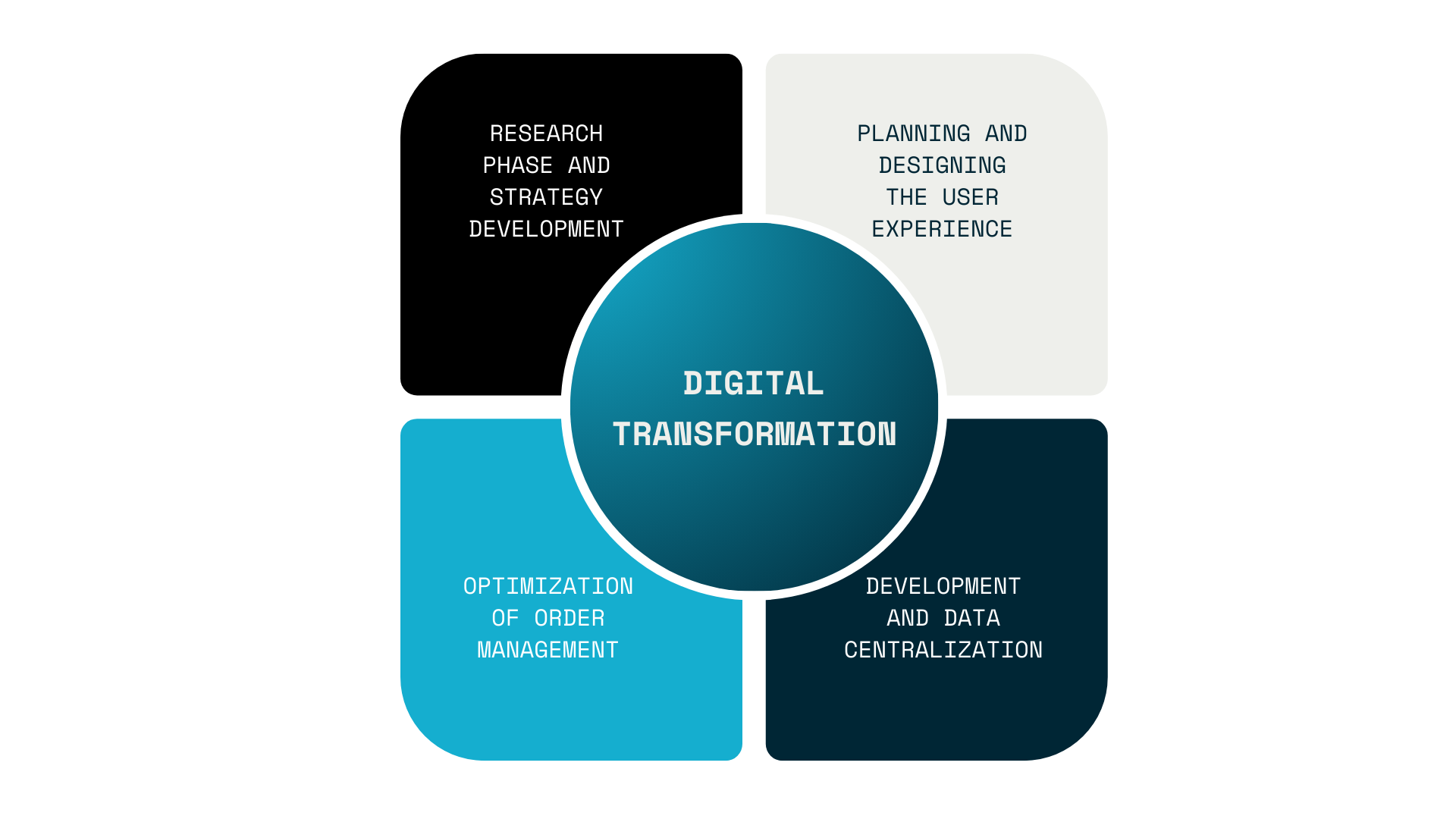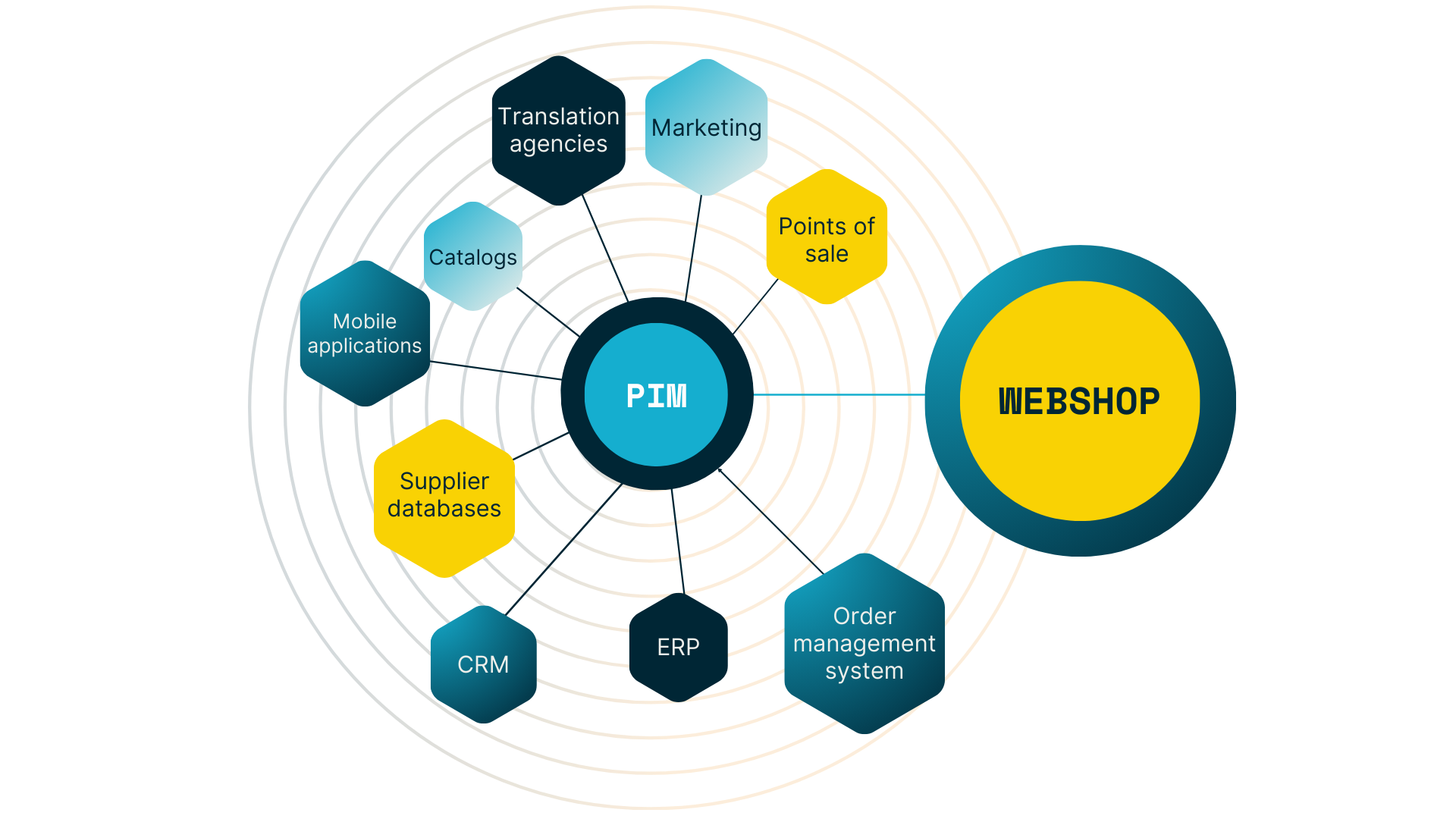Digital transformation is the key to staying competitive in the fast-growing world of online sales. The biggest challenges companies face are often related to resistance to change, high costs and a lack of relevant skills. The success of the transformation is based on a clear vision, precise planning and the gradual introduction of changes, while at the same time it includes employee training and adaptation of business processes. With our hands-on experience in planning and implementing comprehensive transformations of online stores, we know very well what needs to be taken into account, what to think about and what to anticipate in order to ensure a successful digital transformation.
Clear strategy and long-term vision
For us, digitization is not just the introduction of new tools or technologies, but a comprehensive change or adaptation of business processes. We understand how big of a challenge this represents for companies, so we tackle it with a discovery phase that leads to a digital transformation strategy. This document, prepared in collaboration with the various stakeholders of the company, defines the goals, identifies the risks and divides the project into smaller, manageable tasks.
In this phase, we also define technological solutions and tools, not limiting our selection to one platform, but advocating an agnostic approach. This means that we first analyze the challenges and requirements, and then propose the best solution — either by using an existing platform or by developing a completely customized solution. We set clear milestones and benchmarks in the digital transformation strategy, enabling effective monitoring of progress, preventing inefficiency and frustration and facilitating the achievement of expected results and long-term goals.
A seamless and personalized shopping experience
Renovation of a webshop allows companies to present a more modern design, improved user experience and a more personalized offer. In addition, the renovation is an opportunity to refresh the visual image so that the store better reflects the company’s values and identity.
We do this through heuristic analysis based on more than 150,000 hours of user experience research findings, summarized in more than 650 design guidelines and 275,000 user experience performance evaluations — insights used by most of the world’s leading online stores.
Even when implementing the design, we fully adapt to the needs and wishes of the individual company, always looking for the most practical and cost-effective solution.
Information centralization
For the digital transformation of an online store, it is extremely important that information about products and customers is accurate and up-to-date. Our aim is to connect different departments, from sales to logistics and marketing, and systems where information is (often still) decentralized. Otherwise, duplication of information, errors or other inefficiencies can occur. As a solution, we offer the implementation of a product information management system (PIM), which acts as a data centralization center. PIM enables the collection and analysis of large amounts of data on customers, products, categories and sales trends, leading to consistent, unified and up-to-date information across all sales channels.
PIM systems are one of the most important foundations for business growth without the need for a proportional increase in data management resources. In addition, they enable effective data management in different languages and regions, which is key to global competitiveness. Adding new language versions to enter a new market is easy and fast with PIM systems. We are also paying more and more attention to the integration of various AI tools tailored to the client’s needs, which optimize tasks, reduce costs and improve data quality. In this way, companies can optimize the preparation of necessary content, such as multilingual descriptions of brands, products and product groups. We are aware of how demanding the process of collecting diverse data from various platforms and systems that have been used over the years of business is, so we offer professional support and guidance in content preparation and data optimization.
Optimization of order management
Optimizing order management processes is an important goal of online store digitalization, which contributes to greater efficiency, better user experience and greater customer satisfaction. We take advantage of the flexible structure and the ability to adapt PIM systems to establish connections between orders and other entities. These custom solutions fully adapt to the needs and requirements of the company and include functionalities for creating, changing and general management of orders, tracking their status, updating stocks, processing payments, sending shipments and efficient communication with customers.
Due to the complexity of the processes related to order management, we also precisely define specific user roles in the discovery phase. This enables customized review and control, which leads to greater efficiency and productivity of employees. By developing an order management system within the framework of PIM systems, we close the circle between placing an order in the online store and shipping the goods, whereby the automation of certain steps reduces the processing time of an individual order, the possibility of human errors and the number of connected systems, which in turn means lower monthly maintenance costs.
We integrate PIM systems with other CRM systems and connect them to ERP systems. With two-way synchronization between the PIM systems and the backend systems of the online store, we ensure that customers can easily monitor the status of their orders, receive updated information and be notified of any problems or delays on time.
Today, digitization is no longer just an advantage, but a necessity for companies that want to remain competitive in e-commerce. It enables rapid adaptation to market changes, such as fluctuations in demand or the introduction of new technologies. We believe and are aware that the transition to a fully digital business requires a thoughtful integration of various technologies, systems and platforms and the close cooperation of a group of experts from the fields of business consulting, technology, data analytics and software development.






